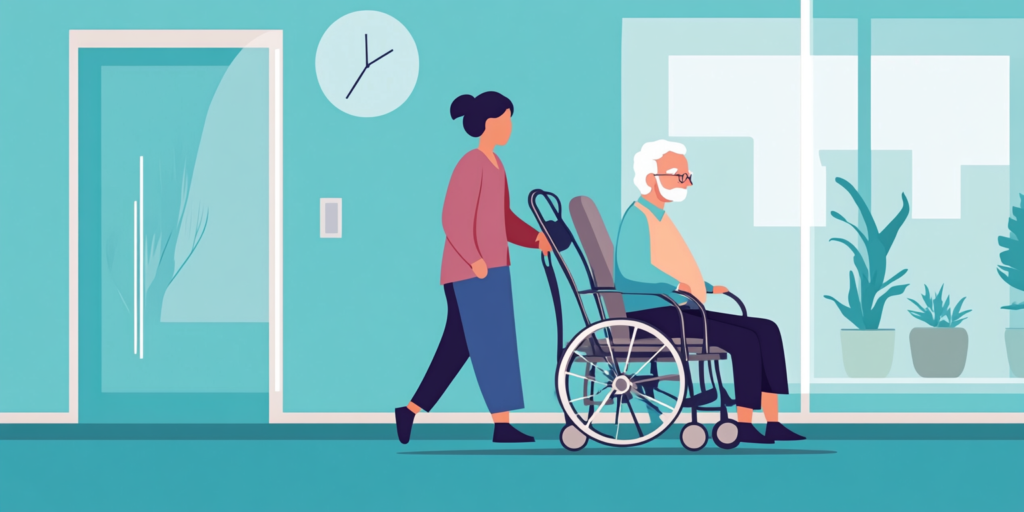1. Create a Safe Environment
Safety is paramount when preparing your home for social care visits. Make sure that the home is free from hazards, especially if your loved one has mobility issues or cognitive impairments such as dementia. Some safety measures to consider include:
- Remove clutter and obstacles: Clear hallways and common areas of any tripping hazards such as loose rugs, wires, or small furniture items.
- Install grab bars: In the bathroom, installing grab bars around the toilet and in the shower or bath can help prevent falls.
- Ensure adequate lighting: Make sure all areas of the house are well-lit, especially staircases, hallways, and entrances. Consider installing night lights in key areas to help with navigation during the evening.
- Secure rugs and mats: Use non-slip mats in the bathroom and kitchen, and secure any loose rugs with tape or non-slip underlays to prevent slipping.
2. Prepare Essential Supplies
Having all necessary supplies ready for the carer can help the visit go smoothly and ensure your loved one’s needs are met. Gather and organise any items the carer may require, such as:
- Personal care products: Stock up on toiletries like soap, shampoo, and incontinence products if needed. Make sure they are easily accessible in the bathroom.
- Medication: Ensure all medications are organised, labelled, and stored in a safe but accessible location for the carer. A pill organiser or dosette box can be helpful for keeping track of daily doses.
- Mobility aids: If your loved one uses a walking frame, wheelchair, or other mobility aids, ensure these are in good condition and easily available.
- Comfort items: Make sure your loved one’s comfort items, such as blankets, cushions, or reading glasses, are within reach to create a homely, comforting atmosphere.
3. Set Clear Communication Channels
Good communication between the family, the carer, and your loved one is essential for successful home care visits. Make sure everyone involved is on the same page regarding care routines, preferences, and any specific needs. Here’s how to ensure effective communication:
- Create a care plan: Provide the carer with a clear care plan that outlines your loved one’s routine, preferences, and any specific requirements, such as dietary restrictions or medical needs.
- Contact information: Keep a list of emergency contacts, including family members and healthcare professionals, easily accessible for the carer. Make sure they also have your phone number in case they need to reach you during the visit.
- Regular updates: Arrange for regular check-ins with the carer to discuss any changes in your loved one’s condition or care needs. This helps ensure that care remains consistent and responsive to any evolving health concerns.
4. Create a Comfortable Atmosphere
Social care visits should not feel clinical. It’s important to create a warm, homely environment where your loved one feels comfortable and at ease. Simple touches can make a big difference:
- Personalise the space: Surround your loved one with familiar items, such as family photos, favourite books, or mementoes that bring them joy.
- Temperature control: Ensure the home is kept at a comfortable temperature. If your loved one is prone to feeling cold, have blankets readily available or adjust the heating as needed.
- Maintain a calm environment: Minimise loud noises and distractions during the visit, as this can help create a peaceful atmosphere where your loved one can relax and engage with the carer.
5. Be Involved in the Process
While carers are professionals who are trained to provide support, your involvement as a family member is still valuable. Being part of the care process can help your loved one feel reassured and supported.
- Introduce the carer: If this is a new care arrangement, take the time to introduce the carer and help your loved one become familiar with them. This can help ease any anxiety or uncertainty about the visits.
- Collaborate with the carer: Work with the carer to ensure they have everything they need to provide the best possible care. Be open to discussing any adjustments or suggestions they may have to improve the care environment.
- Respect privacy: While it’s important to be involved, also remember to give your loved one and the carer space and privacy during personal care tasks, unless your presence is requested.
6. Review the Homecare Services Regularly
Finally, it’s important to review how the home care service is going on a regular basis. Ask for feedback from the carer and your loved one to ensure that the care provided is meeting their needs. If any adjustments are necessary, don’t hesitate to discuss them with the care provider.
Preparing your home for social care visits doesn’t have to be overwhelming. By taking these practical steps, you can ensure that your loved one receives the care they need in a safe and comfortable environment, allowing them to maintain their dignity and independence while receiving essential support.







